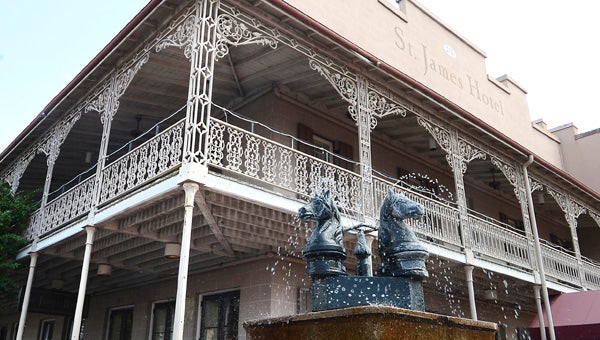City prepares to sell St. James Hotel to Mark Peterson
Published 9:30 pm Saturday, December 5, 2015

Mark Peterson is working to buy the St. James Hotel from the city of Selma and has been working as the hotel’s general manager since Dec. 1.
More details about a proposal to sell the St. James Hotel to businessman Mark Peterson have come out.
Though the agreement has not been finalized, the potential sale was discussed at Thursday night’s city council work session.
If approved, the city would sell the hotel March 1 to Peterson and his company, Ceyero Consulting, for $1.
The council talked about the city keeping a 10 percent stake in the property. Other proposals have called for Peterson to assume 100-percent ownership from day one.
In lieu of an upfront payment, the city would be paid based on future earnings for a minimum of $1.2 million. The payout to the city would be made in years eight, nine and 10 or longer if needed to reach $1.2 million.
The deal also includes clauses outlining how the city could take back ownership if a minimum of $1 million in mutually agreed upon upgrades aren’t made.
If Peterson fails to complete those improvements within 36 months, the hotel would go back to the city. However, the city would owe Peterson for what he had put into the hotel.
The proposal also requires the building to keep the name the St. James Hotel and to continue to operate as a hotel and restaurant.
DEADLINES MOVED BACK
The city of Selma took over management of the St. James Hotel on March 17 from Strand Management.
At the time, several city leaders were optimistic a decision to sell the hotel or bring in a new management company would be made within 90 days.
At the end of June, the majority of the council voted to extend that deadline an additional 90 days.
Since September, the council voted at least twice to continue operating the St. James as the city explores all options.
In the first meeting of November, the city council voted to allow Councilwoman Susan Keith to negotiate terms of a letter of intent with Peterson. As of Thursday, that letter has been submitted, but council members do have a draft of what he is proposing.
Keith said the delay was because the city asked Peterson to explore ways to involve Wallace Community College Selma and Trenholm State Technical College culinary and hospitality students in the hotel’s bar and restaurant.
“He came to us with a proposal. The city is the one that changed. We are the ones that said let’s do this other thing,” Keith said. “He can’t give us a letter of intent until he has all the partnerships lined up.”
Peterson has been acting as manager of the hotel since Dec. 1. During Thursday’s meeting, Councilman Cecil Williamson asked City Attorney Jimmy Nunn to determine when the council voted to allow Peterson to run the hotel.
“Would somebody be able to show me where we voted to make him manager of the St. James?” Williamson asked the council.
Keith and Councilwoman Angela Benjamin said they would support a vote to affirm the decision to allow Peterson to manage the hotel between now and the sale of the hotel.
DOLLAR DRAIN
The current state of the St. James starts in the summer of 2007. That’s when Gourmet Services, Inc., entered a contract with the city to manage the hotel.
That announcement came with plans of a valet, concierge and fine dining restaurant.
Those dreams were never realized. The inexperienced hotel management company struggled through the summer of 2013 when they left town just six months into a renewed five-year contract.
The St. James was left in poor shape with allegations of missing items and unpaid invoices — including an $80,000 tax bill.
There were threats of a lawsuit, but the city never took the matter to court.
For about a year, the St. James operated with a team of volunteers and several part-time employees, along with cash infusions from the city, while leaders searched for new owners or managers.
Strand Management took over the hotel in July 2014 under a contract that called for the city to pay them a $4,000 monthly management fee plus 3 percent of profits.
Despite bringing in a chef from South Carolina and trying to revamp the restaurant, the St. James never turned a profit under Strand’s management.
The company was given five months to improve operations while the city covered tens of thousands of dollars in operating expenses, including payroll.
By February, the company asked to be let out of its contract with the city, which the council approved in March. Strand left the city holding the bag again — some $89,000 in past due invoices, including a $20,000 power bill.
Since the spring, the city has been operating the hotel as it would any other department.
The city has been spending about an average of $20,000 a month on the hotel. Williamson estimates the city has spent approximately $500,000 since Gourmet Services left in 2013.
City Treasurer Ronita Wade said until she’s instructed to do otherwise she treats the St. James expenses the same as she would any of the city’s obligations.
“I can’t decide to shut down operations on my own,” Wade said. “I have to continue to pay bills unless you make a decision that you no longer want to see the St. James Hotel continue to operate.”
Wade said the St. James has been borrowing from the general fund. When that happens, a liability is recorded and paid back from the revenue that is coming in.
Williamson said barring an unexpected increase in revenue all of that money would eventually have to come from some department’s budget.
“There is going to be a day of reckoning,” Williamson said. “We are going to be looking for $170,000 to put back into the general fund.”
PETERSON’S PLAN
The majority of the council hopes Peterson is the answer the city has been looking for the past two and a half years.
Peterson grew up in Selma and graduated from Selma High School in 1987 after being named the Paul. M. Grist Boy of the Year.
After high school, Peterson attended Dartmouth College in New Hampshire, earning a bachelor’s degree and eventually an MBA from the Tuck School of Business.
He has worked for several companies, including General Mills and Accenture, where he did consultant work for companies like Hyatt, Best Buy, Coca-Cola and Wal-Mart as well as large utilities.
He later created his own company, PrideRock Holdings, a biometrics firm that specialized in fingerprint and data management technology. After selling that business, he created a consulting company, Ceyero Consulting, and wrote a book, “Guerrillapreneur.”
Coming home, Peterson decided to get involved in the community. He bought a house and joined the Selma Rotary Club and asked Mayor George Evans what he could do to help.
He started teaching business classes at Concordia College Alabama and volunteered with the EDA.
“That got me looking around for opportunities where I could really put a stake in the ground. I think this St. James opportunity is one of those that is potentially a game changer,” Peterson said.
Though Peterson has no experience of running a hotel or restaurant, he said he’s ready to bring on talented staff and is consulting with hospitality firms. He said his interest in the St. James is for the long-term.
“I see myself getting buried somewhere in the back of this building,” he said. “I’m completely bought in for this being the cornerstone of the revitalization of Selma and downtown.”
But the transformation won’t happen overnight and won’t be cheap. Peterson said improvements would have to be made in incremental phases. The first phase is fixing basic issues like broken air conditioning and repairing the hotel’s image in the community. Later phases would include improving the hotel’s technology, adding rooms and making the St. James a conference center destination.
OTHER OPTIONS
Keith said the city has received no other realistic proposals for the St. James and is moving forward to make Peterson’s proposal work.
“It’s closed. It’s done. We have a buyer,” Keith said.
Representatives from the Auburn Hotel and Conference Center met with at least three members of the Selma City Council last week about their interest in the property. However, the group has made no formal offer for the council to consider.
Though Keith didn’t refer to the group by name, she said everyone has been given a fair chance in the process.





